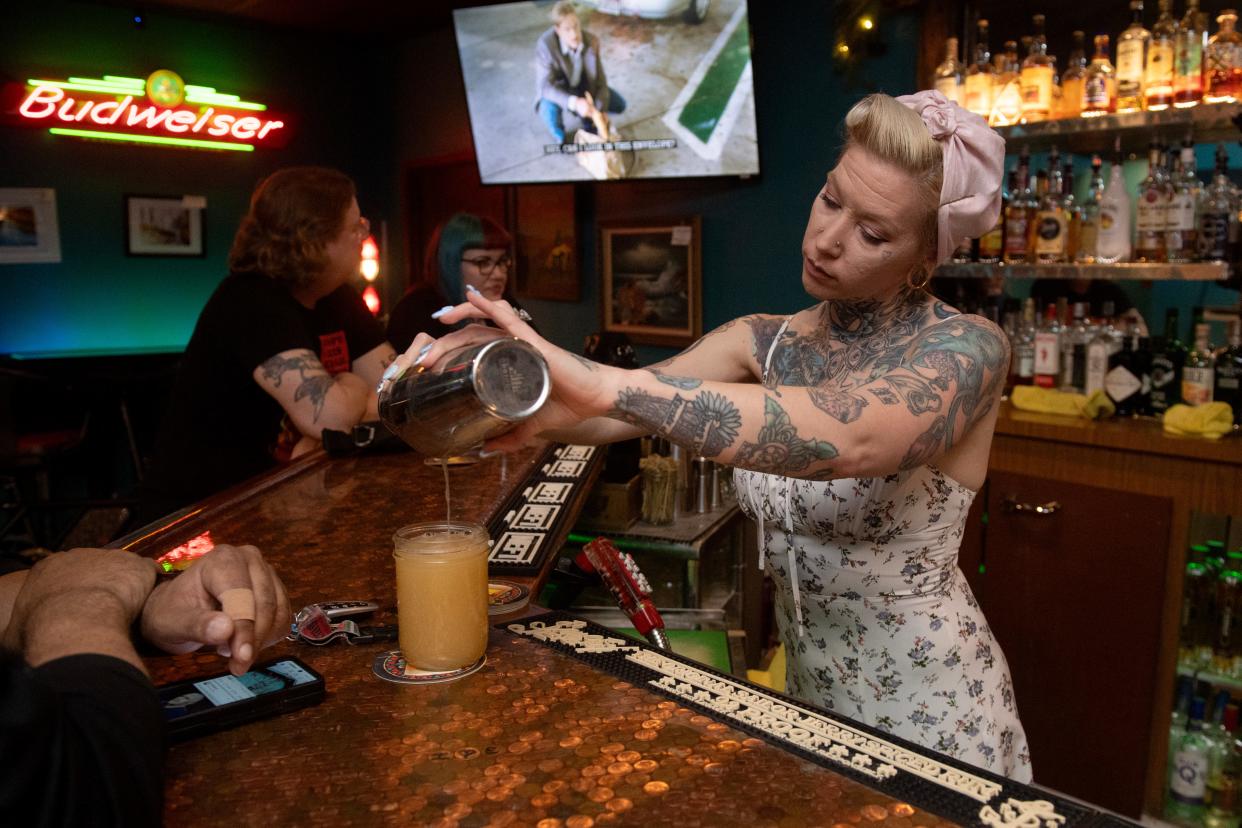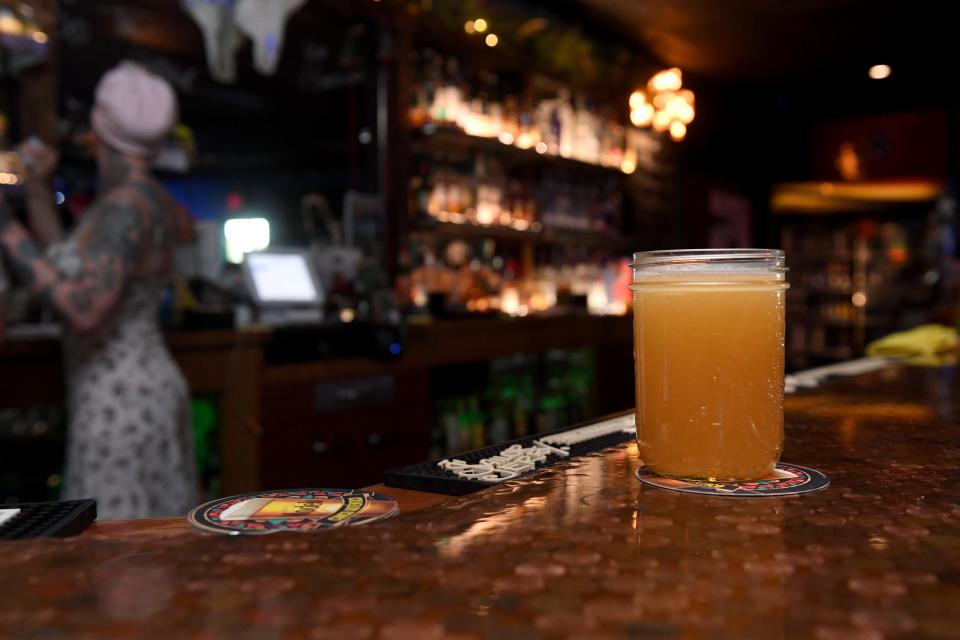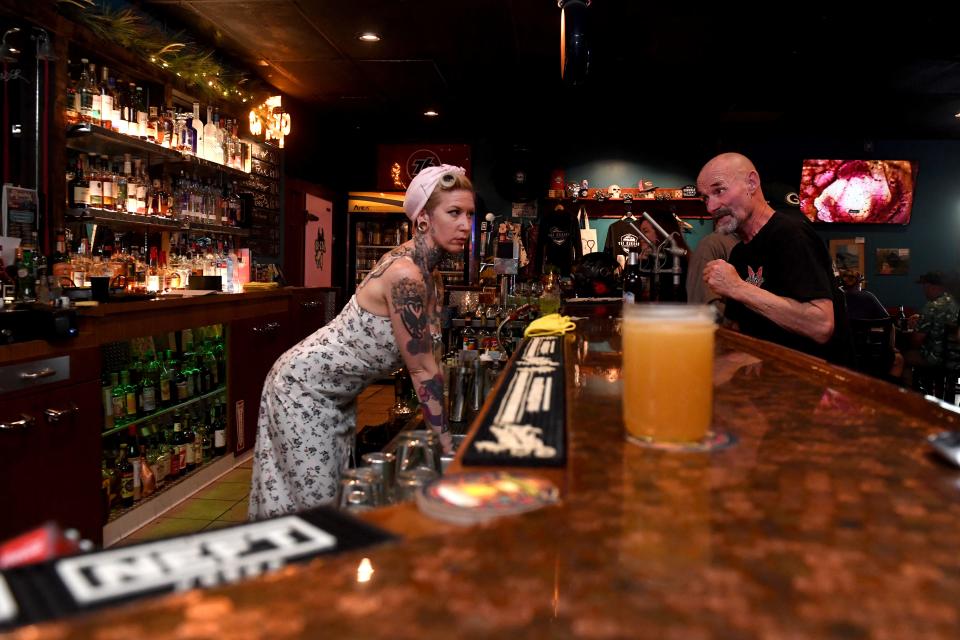New California law to require drug testing devices at bars, nightclubs

Ashley Baxa has had her drink "roofied" twice in her life. Once at 21 and another time at 27 — both with people she trusted.
“Nothing happened to me, thank God, because my friends were like, 'You have to go home,'” said the veteran bartender of having her drink secretly spiked. The symptoms made her sick for two days and were severe enough she thought she would die.
A new law aims to prevent others from Baxa's experiences, requiring certain alcoholic beverage license holders in California to provide drug testing devices to customers starting July 1. The devices are designed to test for common date-rape drugs, often called roofies.
The term roofie refers to a dose of Rohypnol, a trade name for the sedative flunitrazepam, and has come to mean either being drugged against one's will or sedating drugs being slipped into drinks to facilitate sexual assault or other crimes.
Rohypnol has never been approved for medical use in the United States. In other countries, it is commonly prescribed to treat insomnia, according to the Drug Enforcement Administration.
The new law will affect around 2,400 businesses across the state, according to Devin Blankenship, spokesperson for the California Department of Alcoholic Beverage Control.
“The hope is that people who go to bars and nightclubs can feel safer, that if they do suspect that their drink has been tampered with they'll be able to request these kits, do the test right there,” he said.
Baxa, 32, has been bartending at the Garage Bar in Ventura for a year and a half since she moved from Virginia Beach. She believes that a law like this is “super necessary,” in part, because women are often devalued.
“So if somebody's looking out for us, that's kind of cool,” she said.
Baxa has worked at more than 25 bars and has many customers and coworkers, men and women alike, tell her that they had been secretly drugged at different places, in Virginia and Ventura County.
“There's only so much that you can do especially if you're one bartender. Not everywhere has security. Not everywhere has like a close-knit group of people that watch out for girls,” she said.
What is Assembly Bill 1013?
Assembly Bill 1013, signed by Gov. Gavin Newsom in October 2023, will mandate businesses with a Type 48 license from Alcoholic Beverage Control to not only offer drug testing devices on premises, but also have signs displayed in a noticeable spot saying, “Don’t get roofied! Drink spiking drug test kits available here. Ask a staff member for details.” A sample sign is available on the state agency's website.
“We've allowed roofying to proliferate, I believe, because the assaults are taking place with women and LGBTQ community. If it was happening to men, straight men, it's something we probably would have acted on much sooner. And that’s shameful,” said Assemblymember Josh Lowenthal, D-Long Beach.
He is part of the industry himself, having owned bars and restaurants for 20 years. He spearheaded the legislation with Assemblymember Mike Gipson D-Gardena.
“It's unconscionable for owners to know that their place of business could indirectly be involved in sexual assault as a location,” Lowenthal said. “We just are not doing enough to stand up for victims right now.”
The assemblymember said that this problem affects everybody but it’s been in the shadows. Through his efforts to bring it to light, he said he heard directly from many colleagues and advocates who shared their experiences of being roofied.
Type 48 licenses are issued to bars and nightclubs. According to the ABC licensing catalog, the license authorizes the sale of beer, wine and distilled spirits for consumption on the premises where sold. Minors are not allowed on the premises and food service is not required.
AB 1013 will require all Type 48 licensed establishments to either offer the drug testing device to customers free of charge or for sale at a reasonable cost. Additionally, businesses must ensure that all testing devices offered to customers have not exceeded their expiration date.
“It's a pretty simple law that promotes public safety,” Blankenship said. “We really expect that the licensees are going to embrace this law because it's for the betterment of their patrons. It bodes well for their customers.”
Blankenship added that there could be administrative actions toward licensees if there's a failure to comply.
The law doesn’t specify or recommend any existing drug testing devices or kits but lists various general options that can cover the requirement, including “test strips, stickers, straws or other devices designed to detect the presence of controlled substances in a drink."
These controlled substances could include flunitrazepam, ketamine and gamma-hydroxybutyric acid or GHB.
Changing the culture

While AB 1013 is only applicable to Type 48 licenses, Lowenthal hopes to change the culture through a series of initiatives in the "End Roofying" bill package, which includes four bills currently going through the legislature.
“We're going to keep going at this until we cut down on sexual assault,” he said.
He added that they started with Type 48 licenses because they “have to start somewhere and do not want to have pushback,” but the other bills may cover other avenues for roofying and drug-assisted sexual assault.
AB 2375 would require Type 47 and 48 licensees to provide a lid for a customer who wants it, to protect drinks from being spiked. A Type 47 license is for full-service restaurants that operate as a “bona fide eating place” and serve beer, wine and spirits.
AB 1524 aims to provide students on college campuses access to testing and anti-tampering devices. AB 2402 would mandate the state's ABC to establish a public education campaign and an optional training program for restaurant, bar and nightclub employees, modeled after one in Tennessee called “Safe Bar.”
AB 2389 would require that if employees at a Type 47 or Type 48 licensed establishment learn that a patron has been, or believes to have been roofied, they will notify law enforcement and stay with the victim until law enforcement arrives.
“This is not just a problem that you would see for 21-year-old kids out in the club in major urban areas, it affects all socioeconomic groups, it affects all ethnicities, rural areas, urban areas,” Lowenthal said.
How will businesses in Ventura County be affected?

Before David Rhodes acquired the Garage Bar in Ventura in 2021, it had a somewhat unsavory reputation, he said. Rhodes wanted to make it into a community space.
“We want this place to be where a single woman can come in here and sit down and feel comfortable and have a good time, doesn't just have to come with other people,” he said.
Referring to the new law, he said being safer doesn’t hurt, and he plans to give out the drug testing devices to customers for free, “as long as they're not ridiculously priced.” He also hopes that the signage can also act as a deterrent to perpetrators.
Jared Logan, co-owner of the Oak and Iron bar in Thousand Oaks, said that it's not going to be a "very big expense or extra expense" to have drug testing kits available for customers given that businesses can charge a fair price.
“I looked them up just quickly online and they were maybe $20 for a pack of 15 of them,” Logan said. “So, they’re not like a crazy break-the-bank kind of thing. So we can charge maybe $2 or $3 a piece.”
Logan and Rhodes both believe that having drug-testing devices available for customers is a good thing.
Since 2021, there have been seven reported cases of "rape of an intoxicated person" in the communities policed by the Ventura County Sheriff's Office, according to Dean Worthy, sheriff's spokesperson. Under California law, this includes situations where the victim is roofied as well as where they became intoxicated willingly.
The Garage Bar has not had many reports of customers being roofied except for one woman who came back to say she was roofied. Rhodes said her drink seemed untampered when they checked with surveillance footage.
However, he acknowledged that roofie cases likely go unreported across the country and sometimes people don’t know what’s happening until it’s over.
Dua Anjum is an investigative and watchdog reporter for the Ventura County Star. Reach her at dua.anjum@vcstar.com. This story was made possible by a grant from the Ventura County Community Foundation's Fund to Support Local Journalism.
This article originally appeared on Ventura County Star: New California law to require drug testing kits at bars, nightclubs

